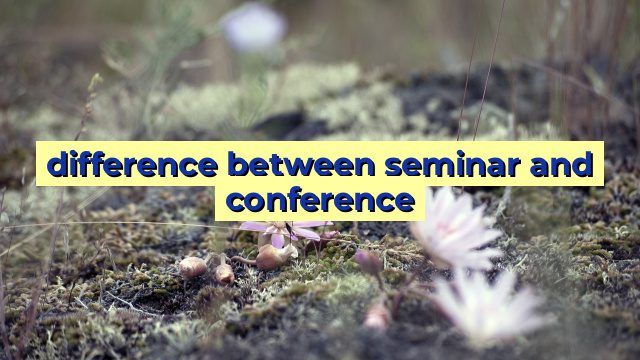Difference between Seminar and Conference
When it comes to organizing corporate events, the two most commonly used terms are seminar and conference. While both events serve the same purpose of sharing knowledge and building networks, they have distinct differences in terms of scale, duration, content, and organization.
Scale
Conferences are usually larger in scale than seminars, and they are often attended by a large number of people from different countries and industries. Conferences may have attendees numbering in the hundreds or even thousands, and they usually involve multiple presentations in different venues.
In contrast, seminars are smaller in scale and are usually limited to a specific audience, such as a group of professionals in a particular industry or department. Seminars typically have fewer attendees, ranging from a dozen to a hundred, and they are often held in a single venue.
Duration
Conferences are usually longer in duration than seminars, and they may last for several days, sometimes even a week. Conferences are usually held in large hotels or convention centers, and they may feature multiple presentations or sessions throughout the day.
Seminars, on the other hand, are usually shorter in duration, lasting a few hours to a day at the most. Seminars may be held in hotels, conference centers, or even in a company’s boardroom.
Content
Conferences usually cover a wide range of topics related to a particular industry or field. Conferences may feature keynote speakers, panel discussions, workshops, and networking events. The content of a conference is usually broad and diverse, and it addresses current issues, trends, and innovations in the industry.
Seminars, on the other hand, tend to focus on a specific aspect of a particular industry or field. Seminars usually have a narrower focus and may cover topics such as new technology, product development, or compliance issues. Seminars may feature one or two speakers, and they may be designed to help attendees develop specific skills or knowledge.
Organization
Conferences usually require more planning and resources than seminars. Conferences may require a large team of organizers, sponsors, and vendors, as well as significant funding. Conferences may take months or even years to plan, and they require careful coordination to ensure that all aspects of the event run smoothly.
In contrast, seminars require less planning and resources than conferences. Seminars may be organized by one or two people, and they usually require minimal funding. Seminars may be organized within a few weeks or months, and they are often held in venues that are readily available and accessible.
In summary, while both seminars and conferences serve the purpose of sharing knowledge and building networks, they have distinct differences in terms of scale, duration, content, and organization. Understanding the differences between the two can help you determine which type of event is best for your organization’s needs.
Table difference between seminar and conference
| Feature | Seminar | Conference |
|---|---|---|
| Definition | A lecture or presentation on a specific topic or subject. | A gathering of professionals or experts to discuss a specific topic or theme. |
| Duration | Usually lasts for a few hours or a day. | Usually lasts for several days. |
| Focus | Focuses on a specific topic or issue. | Focuses on a broader theme or industry. |
| Size | Small to medium sized groups. | Large groups of attendees. |
| Networking | Provides limited opportunities for networking. | Provides ample opportunities for networking. |
| Content | Mostly consists of lectures or presentations delivered by a speaker or a panel of speakers. | Consists of keynote speeches, panel discussions, workshops, and presentations from various experts in the field. |

